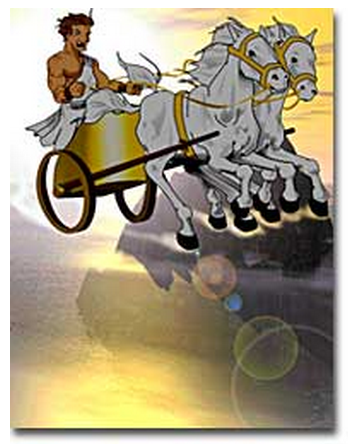11 - Readings: Ancient Greeks and their flood Narrative
Historical text:
Ancient Greece by USHistory.org is licensed CC-BY under a Creative Commons Attribution
A Soap Opera from Hellas
 Courtesy NASA and Cislunar Aerospace, Inc. |
| Many Greek myths explained the mysteries of nature. The myth of Apollo, for example, describes how the sun moves across the sky to rise and set each day. |
The Greeks created gods in the image of humans; that is, their gods had many human qualities even though they were gods. The gods constantly fought among themselves, behaved irrationally and unfairly, and were often jealous of each other. Zeus, the king of the gods, was rarely faithful to his wife Hera. Hera plotted against Zeus and punished his mistresses.
The Greek gods were highly emotional and behaved inconsistently and sometimes immorally. Greek religion did not have a standard set of morals, there were no Judaic Ten Commandments. The gods, heroes, and humans of Greek mythology were flawed.
In addition to Zeus and Hera, there were many other major and minor gods in the Greek religion. At her birth, Athena, the goddess of wisdom, sprang directly from the head of Zeus. Hermes, who had winged feet, was the messenger of the gods and could fly anywhere with great speed. Aphrodite, the goddess of love, was the most beautiful being in the universe. Her brother, Ares, the god of war, was sinister, mean, and disliked. Poseidon, ruled the sea from his underwater place and Apollo rode his chariot across the sky, bringing the sun with him.
Hades was in charge of the dead in the underworld. Almost all people went to Hades after they died whether they were good or bad. To get there, the dead had to cross the river Styx. Charon was the name of the boatman who ferried the souls of the dead across the river Styx to Hades.
Typically, the gods punished those who were bad. For example, Tantalus who killed his own son and served him to the gods for dinner was sent to Hades and made forever thirsty and hungry. Although there was a pool of clear, fresh drinking water at his feet, whenever Tantalus bent down to drink, the pool would dry up and disappear.
Likewise, over his head hung the most delicious fruit. However, whenever Tantalus reached for them, a wind would blow them just out of his reach. The English word "tantalize" derives from the name Tantalus.